
Volume 1812a
Georges Dodds'
The Ape-Man: his Kith and Kin
A collection of texts which prepared the advent of Tarzan of the Apes by Edgar Rice Burroughs
Presents
http://www.erbzine.com/mag18/berthet2.htm

| Chapter VI. | The Bimbang. |
| Chapter VII. | The Chinese Garden. |
| Chapter VIII. | The Orang-Outang. |
| Chapter IX. | The Visit. |
| Chapter X. | The Capture. |
| . | CONTINUED IN PART III |
The balley of New Drontheim then consisted simply, as we have said, of a kind of shed, with a roof made of palm-leaves, supported on pillars of carved wood. The furniture consisted simply of a few benches.
Now it was usual, when a friendly vessel entered the port, for the people of the place to give an entertainment or bimbang to the crew and passengers of this vessel. They were invited to the balley in the evening, and there they found all the village assembled to receive them with all due ceremony. Young Malay girls, dressed in their finest attire, paid them compliments, an old man, well skilled in the art of making fine speeches, acting as their mouthpiece; then they presented their boxes of siri, or betel, to the travellers, who were bound to take the siri, and leave in its place little presents, differing in value according to their generosity. These presents generally consisted of fans, looking-glasses, and other nicknacks from Europe or China. This ceremony performed, the rest of the evening was spent in amusements of various kinds.
It was a fête of this kind that the inhabitants of New Drontheim gave to the crew of the Gertrude two days after the arrival of that vessel; and at the hour appointed for the meeting, the balley presented a most animated appearance. Out-of-doors it was one of those warm, clear nights which only occur in the tropics. And the sky was spangled all over with stars. A thousand different kinds of fire-flies darted about in the sky, leaving brilliant lines of light behind them, while, every now and then, the wind brought the sweet perfumes of the clove and cinnamon-trees. A profound quiet reigned around, so that you could even hear the faint, distant murmurs of the forest.
Within, the room was lighted by a great number of Chinese lanterns of coloured paper, such as are now becoming popular in Europe. Hung in festoons, between the pillars which supported the leafy roof, they looked very pretty, and strange insects might be seen darting about around them, splendid moths, attracted by the unusual light. The kalintangs, a kind of musical instrument, formed of little gongs, that were struck with a little stick, mingled their sweet and melodious sounds with the voices, male and female, of improvvisatori, who were holding among themselves one of the musical contests called jantouns. In the middle of the room the young Malay girls, in their dresses of embroidered silk, and with rings of gold and silver round their legs and arms, executed graceful dances, waving their scarfs at the same time, while the mothers and duennas, seated, or rather squatted, round the dancers, played the part of wallflowers, as in civilized countries. The rest of the assembly was divided into distinct groups, according to nationalities, colours, costumes, and characters. In the first place, we must mention the Dutch soldiers, proud of their dirty, patched, and scanty uniforms, the original colour of which it was difficult to guess. Gathered together in a corner, they talked phlegmatically of their Dutch canals, on which they used to skate in the winter time, and of their cool little gardens with earthenware statues. Then came the copper-coloured Malays, their heads enveloped in bandannas, who, seated on the ground, were exciting two cocks, whose spurs were armed with steel points, to fight desperately. Behind them were numerous spectators who had bets on one or other of the champions; and at the conclusion of each fight savage cries, curses, and threats were heard, ferocious beyond description. Further in were the opium-smokers, Chinese and Malay, who were giving themselves up much more quietly to their dangerous and irresistible passion. The negroes and negresses met together to laugh and sing, or dance the chika and the bamboula; but all these merry blacks took care to keep out of the way of the Malays, who, on all occasions, showed a profound contempt for them, on account of the whiteness of their teeth. Then there were other motley groups of Hindoos, dressed in calico, Javanese with pointed hats, and some sailors from the Gertrude, smeared with tar, and chewing tobacco or betel according to their tastes.
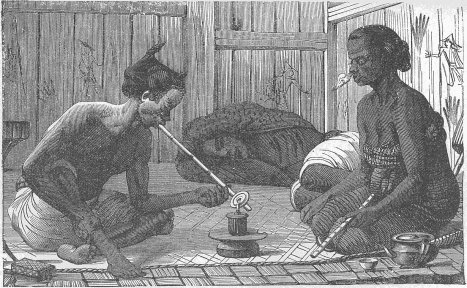
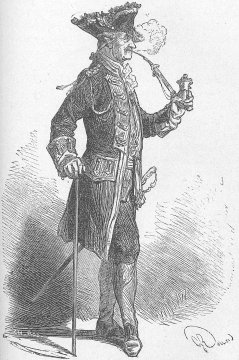
At the other end of the balley, in the opium-smokers' corner, was a very different scene.
Among the number of these maniacs it was not surprising to see the comrade of Elephant-Slayer, the taciturn Malay, called Opium-Smoker, par excellence. He was able to enjoy himself greatly at this feast, after his fashion, thanks to the rather excessive liberality of the doctor, who had enriched him that morning with a considerable provision of his favourite drug. So he took advantage of the opportunity of getting intoxicated in good company. Stretched on the bare ground, his head resting on a log of wood, he held in his hand the instrument by which he inhaled the vapours of the dangerous narcotic. Seated at his side, Yaw, the head of Palmer's Chinese, helped him with a zeal that could hardly be disinterested, and took good care that the fire in his friend's pipe should never go out.
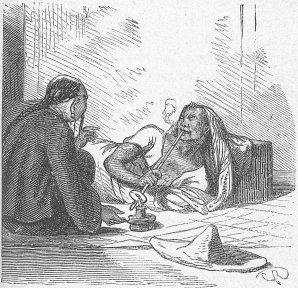
It was the hope, then, of some such windfall that made him so eager and so attentive. It was a sight worth seeing to watch him, rolling about like a child's tumbler, and grimacing like an idiot, while his long tail wriggled about behind him like an angry snake. As loquacious, insinuating, intriguing, as the other was brutish and cruel, he would say to him in a caressing way:
"Yaw is your friend; friendship is golden. Yaw will watch over you like a mother over her sleeping child. Give yourself up to the delights of this divine gum, and may heaven send you 'vermilion coloured' dreams, dreams full of golden pagodas and sweet-scented tea! Indulge yourself in the ecstasy that makes the poor man equal to the powerful mandarin, that calms the pain of the sufferer, and makes life expand like a flower in the sun!"
These grand speeches, pronounced half in Chinese, half in the patois of the country, were lost, no doubt, on the infatuated man, who was becoming already intoxicated; but they lulled him to sleep, as the song of a nurse lulls the infant who cannot understand it. Yaw was not impatient; still smiling and attentive, he kept the pipe alight, taking care that one dose of opium succeeded another, and repeating, as he rocked himself to- and-fro like a figure on springs:
"The man that has a friend is a happy man." While waiting, he gathered up carefully the little bits of the darling drug that were only partly burnt, and watched 'his friend' out of the corner of his slanting eye, that he might know the moment the Malay lost his consciousness; but Opium-Smoker had been long used to opium, and it required a strong dose to intoxicate him. Besides, this nauseous vapour did not produce upon him the quiet ecstasy that the Chinaman reckoned it would; on the contrary, the more he took of the soporific drug, the more his brown face twitched convulsively, the more fixed, and hard, and bloodshot his eyes became.
Still Yaw thought he should soon see sure symptoms that the smoker was completely intoxicated. Then, without interrupting his flatteries, he looked in the Malay's sarong for the box of bark that contained the supply of opium, opened it and filled the pipe again. As his comrade was certainly no longer able to inhale the opium, he stuffed the box into his own dress, and put the pipe to his lips. He did not leave off rocking himself to- and-fro and grinning, and while his long tail swung backwards and forwards with each movement of his shaven head, he repeated, with a well-satisfied air:
"Friendship is golden. It is my turn now! A friend ought to share all he possesses with his friend. I learned that saying from my second cousin, the mandarin of the crystal button, who owns several gardens near Canton."
He began to smoke busily that he might as soon as possible find himself in the same state as his dear friend, and he did not notice another Chinese at his side, one of those under him, who was watching him that he might play him the same trick when the time came. Neither did Yaw notice that, while he was falling into the much-desired ecstasy without having spent a penny, Opium-Smoker was watching him with a steady, menacing eye, and that the Malay's trembling hand was fumbling for his kris in his belt; the pleasure of gratifying his ruling passion having made him forget his usual prudence and cowardice. All at once Smoker uttered a hoarse cry, something like the roaring of a tiger in the forest; and with a frantic effort managed to sit up; his only partial intoxication had allowed him to perceive the abominable breach of confidence of which he was the victim, and a fit of fury overcame the numbness that was creeping over his limbs. He threw himself on Yaw, kris in hand; and well was it for the Chinaman that he had not lost his presence of mind and power of motion, or he would never have deceived anyone again. Quick as lightning he sprang on one side, while Opium-Smoker, missing his blow, fell full length on the ground, and buried the blade of his terrible dagger deep in the ground.
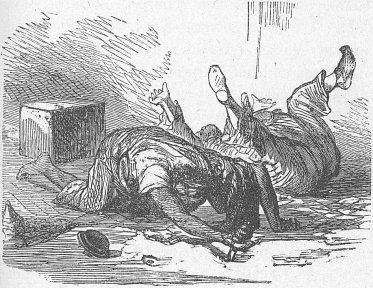
"He is amokspower" (raving), said one.
"Yes, yes, he is amokspower!" was repeated on all sides.
And the women fled instantly; the timid party, that is to say, the negroes and Chinese, prepared to follow their example, while the Dutch soldiers, on the contrary, drew their swords and stood on the defensive.
To understand the full import of the expression, "he is amokspower," it must be remembered that the opium-smokers among the Malays are subject to attacks of frenzy, during which they attack and kill all who approach them, and no one doubted that such was the case with Smoker then. He had attacked Yaw suddenly, and the rascally Chinese uttered such wild cries as he rolled about on the earth, that everybody thought he had received a mortal wound. They now expected that the maniac would spring up and attack the rest of the unoffending people. And this was why the Dutch soldiers, accustomed to such scenes, drew their swords, while the greater part of the assembly fled in disorder. A ring of naked blades was rapidly formed round the fallen Malay. The Governor had not stirred from his throne, and continued to smoke his pipe with true Dutch composure. When the soldiers turned to him for orders:
"Kill him," he said quietly.
Major Grudmann was, however, an excellent man; but, hardened by the exercise of absolute power in these savage countries, he regarded a Malay intoxicated with opium in the same light as he would a buffalo that had got free, or a venomous serpent.
The soldiers, with the same sang-froid, were going to execute their commander's order, when a man, dashing into the circle, scattered the swords with an incredible disregard of danger. It was Elephant-Slayer who came to the help of his countryman, far less, perhaps, out of affection for him, than out of hatred to the Europeans who were about to strike a Malay.
"Smoker is not amokspower," he cried; "but he has been insulted, robbed by that vile Chinese. He was avenging himself, and quite right too. Do not touch him."
He pointed to Yaw, who rose from the ground without any wounds and ran off as fast as his legs would carry him. Opium- Smoker, unable to follow his example, tossed about on the ground, uttering dismal roarings.
The soldiers looked again to Grudmann.
"Well, if he is not dangerous, let him alone," slid the Major, shrugging his shoulders.
The Dutchmen retired unmoved. Elephant-Slayer sat down by his comrade, took away his kris by way of precaution, then folding the cloth of his sarong round him to make it impossible for him to hurt anybody, he carried him out of the balley.
Five minutes after, the people, finding there was no cause for alarm, resumed the songs, dances, and conversations that had been interrupted.
This incident produced a certain sensation among the Europeans grouped round the Governor. Smith said aloud, with a smile:
"This is a good specimen of the manners of the country! Really, Major, I do not congratulate you on the exquisite civilization of your subjects!"
"Bah, that's nothing!" said the Governor; "things much more serious often happen here, and I require some firmness to maintain order. However, I should have got rid of these two unmanageable Malays long ago; but they belong to Mr. Palmer, and out of consideration for him I have been easy with them and not driven them out of the colony."
"Thank you, sir," replied Palmer; "as for me, I have not yet had sufficient cause to send them away. Generally, Opium-Smoker is only an inoffensive animal, and he does very well to lead the buffaloes to pasture. Elephant-Slayer is considered the best hunter in the colony."
Palmer was anxious to get back to his wife, who was not very well when he left her, and quitted the balley; the Governor went away a little time after, but was soon obliged to return to restore order again. A sailor and a Malay, having quarrelled, had come to blows, and the Malay had drawn his kris. The Governor sent him to prison, and peace was restored.
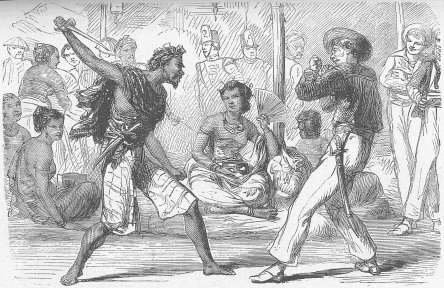
The houses in the colony were shaded by large trees, in clusters, forming an unbroken line of foliage to the forest. Under these trees, at this hour of the night, it was perfectly dark, and the darkness was hardly broken at all by the feeble, distant light which proceeded from the dancing-room. However, the planter was advancing without hesitation towards the avenue of tamarind-trees, when a frightful howling, quickly followed by a heavy blow, like that of a hatchet striking the trunk of a tree, was heard at a little distance. Richard stopped instantly.
"What is the matter? who's there?" he asked, in the language common to the inhabitants of the colony.
No one answered; but in a place where the trees were not quite so thick he perceived a man of great stature, standing still with a stick in his hand.
"Who is there?" repeated Richard loudly.
A kind of growl, of a singular character, answered him this time; but the man with the stick disappeared, and all was quiet again.
"Bah!" said Palmer, after waiting a moment; "it is some Chinese, probably in rather a lively state of mind, or some negro intoxicated with cava."
He walked on, and heard nothing more till he reached his house except, now and then, the distant sounds of the Malay flutes and kalintangs borne upon the wind.
This garden, as well as the house, was situated, as we have said, at the foot of the great red rocks which enclose that end of the valley. A constant stream of fresh, limpid water flowed down from the mountains. This stream entered the garden close to the orchard, through a double grating in the wall constructed to prevent certain dangerous guests from entering with it. Then, after having filled a pretty basin in which some gold-fish sported, and after winding gracefully among the flower-beds, it left the enclosure at the opposite end, and having watered the rice-fields, flowed into the neighbouring river.
The strange ornaments which the rich Chinaman, who had been the first proprietor, and in fact the maker of the garden, had delighted in scattering about with a profuse hand, were still preserved by its European owner. Winding paths of coloured sand formed a kind of labyrinth, the points of which were marked by little towers hung round with bells, by bamboo bridges, hideous idols, grotesque kiosks, and pagodas. Rare and curious plants grew beneath the shade of magnificent fruit-trees, such as bananas, mango-trees, orange-trees, and shaddocks ; and the same odd taste displayed in the general arrangement of the garden was also visible in the details. Thus a graceful shrub was growing on the back of a porcelain elephant, a charming flower was blooming on the head of a bird, or on the tip of a dog's tail, of the same material.
All the strange figures that we see on lacquered furniture, on Chinese screens and fans, were there in reality. Palmer had not taken the trouble to remove them, and the greater number had fallen into decay. But at suitable places he had made belvederes, which rose above the hedge of prickly shrubs forming a fence round the garden, and from each of these a different, but equally fine view of the plantations, the village, the river, and even of the blue sea bordered by the horizon, could be obtained. The most important of the ornamental buildings with which the garden was adorned, was a pagoda situated near the spot where the stream formed a little waterfall over some rocks; and on account of this situation, it was always cool there in all seasons, which was a great blessing in that hot climate. The way to it from the house was by a path of very thick dwarf trees, through which not a single ray of the sun could penetrate. The pagoda, built half of wood, half of brick, had several pointed roofs, placed one above another, such as one sees on the beautiful porcelain ware of the Celestial Empire. It was painted in brilliant colours, and the front still showed some traces of gilding. The interior consisted of one room, which was rather gloomy, and only furnished with a few cane chairs, a little table, and some mats.
It was here that the morning after the fˆte Edward and his cousin Anne had their early breakfast while waiting for the regular family meal. The two children were in the habit of going to the pagoda as soon as they were up, and Mrs. Surrey generally gave them their breakfast. But this morning Mrs. Surrey had been called early into Elizabeth's room, where Richard related to his wife and his sister the events of the evening before. So the negress Maria was told to wait upon the two cousins and to take the entire charge of them; but, tired with having spent nearly the whole night in dancing, she yawned to such a degree that she showed everyone of her thirty-two white teeth, the abomination of the Malays in the neighbourhood.
The breakfast consisted of a large bowl of the yellow, sweet-smelling, creamy milk that the buffalo yields, of bread- fruit and bananas, and cocoanuts freshly opened. The two children, dressed almost alike in white frocks, did justice to the repast with the appetite which is a sure sign of health. They were merry and gay; but Edward was more noisy than usual, because his aunt was away, while little Anna, on the contrary, assumed a dignified and almost maternal air to awe her turbulent companion.
Edward was still on his favourite subject; that is to say, his late adventure with the tiger and orang-outang, and he was declaring proudly that he should go back to the forest soon to see the big flower again, and to look for his bow, a splendid bow that would send long arrows more than a hundred feet. On hearing this boasting, Maria, who had been almost asleep on a chair, started up quickly.
"You not do that, Massa Edward," she said, in a frightened tone; "you not go into the forest, never, never! The man who does not talk would run away with you."
"Run away with me!" answered the child contemptuously. "I should like to see him!"
"God preserve you, Massa Edward," replied the good negress, much agitated; "you too young, not understand. In my country, in Africa, there be these men who do not talk too; but they be black, because there everybody be black, the men that talk as well as the men who do not. Ah, when I was little, they run away with poor negro woman and poor negro boy, and they keep them with them for long time in the woods."
Poor Anna trembled in every limb, but the exploits of the gorillas and chimpanzees of Senegal, which are really said to carry off women and children, made no impression on the self- confident Edward.
"Nonsense! we are not in your country, Maria," he said in his boastful way.
"But the men who do not talk be as wicked in this country as in mine, though they be different colour. Me beg you, dear little massa, not go into the forest."
"I tell you I am not afraid; but tell me, when these wild men of the woods run away with negresses and negro children, do they kill them?"
"No, no, Massa Edward; they give them to eat and to drink, they build them huts; they do them no harm. Black women and black boys come back again some day; but they no more talk; they be savage like them!"
"Oh, you see, they don't do any harm. Besides, this orang is very fond of me; he defended us from the tiger when he was just going to eat us up, so I will go into the forest and fetch my bow."
"Oh, no, no, do not think of it, Edward, dear Edward!" said Anna, in tears, throwing her arms round his neck; "I do beg you ---"
The gallant Edward was very much inclined to cry himself; nevertheless, he answered with rather forced stoicism:
"You are a girl, Cousin Anna; but I, I am a man, and I am not frightened like you."
"Well, yes, I am frightened," cried the poor child, almost devouring him with kisses; "do not go --- promise me not to go!"
And as the little boy hesitated about giving the desired promise, his cousin, changing her tone, said coquettishly:
"Come, Edward! I see you do not love me!"
"Yes, but I do love you."
"Then you don't want me to love you?"
"I do want you to love me. Are you going to take it into your head not to love me?"
"Do you think I can make myself love you? The next time you bring me flowers I will throw them to the goats, and when you want to kiss me I'll run away ---"
For once, the valiant knight was conquered, and began to cry, too; however, he tried one more artifice.
"We shall see then," he replied, in a tone half sad and half threatening; "if you throw my nosegays to the goats, and if you won't kiss me --- I am stronger than you, and I'll beat you."
"Very well! I shall cry and let you beat me." Edward could bear no more.
"No, I won't beat you; no, I don't want you to cry!" he burst out. "Cousin Anna, do forgive me, I have been naughty --- only forgive me, and I'll do anything you like."
"Then you will not try to go back into the forest, where the horrid big monkey might kill you, or run away with you?"
"No."
"You won't think any more about your bow and the great flower and all the rest?"
"No, no, I promise you."
"Then, kiss me; you shall bring me a nosegay this evening, which I will put in my room to remind me of you, and I will love you always."
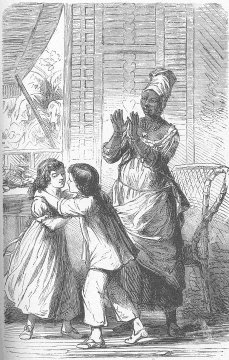
"Well done, well done!" she repeated. "Ah, little miss know how to manage; she will be a clever woman!"
The meal was ended by this time, and Maria set to work to clear it away. The two cousins so lately reconciled seemed to be on the most excellent terms; they vied with each other in trying to efface the remembrance of the quarrel. Anna was not slow in putting Edward's submission to the proof.
"Now, you are a good boy again," she said, timidly and yet coaxingly; "you must not forget that it is time to do your geography lesson. Mamma and Aunt Elizabeth are busy just now, but they will be very vexed if you have not learnt your lesson before siesta."
So saying, the little witch drew out a tattered book which she had hidden in the folds of her white dress. At the sight of this odious old book Edward frowned and began to rebel again.
"Oh, we did not agree to that!" he said gloomily.
But Anna gently persisted; she tried to persuade Edward that he could learn his lesson so beautifully in the pagoda, that nobody would come to disturb him; that a few minutes would be enough for him to do his daily task, and then he would be able to- play with a good conscience. At last she succeeded in carrying her point; and, looking very glum, he took up the horrid book.
"If you would only stay with me while I am doing my lesson!" said the pupil in a piteous tone.
"Oh! I dare say; if I were here you would not look at your book; you would do nothing but laugh and chatter. Now, be brave! If you learn your geography quickly, you will see what I have for you."
"What could the secret be? The pretty child did not know herself; she simply employed a little trick she knew would succeed with her cousin. Once more Edward caught the bait, and opened his book with feverish impatience.
Anna, quite content, gave him a sign of encouragement with her pretty little finger, and went out with the negress, who muttered, smiling:
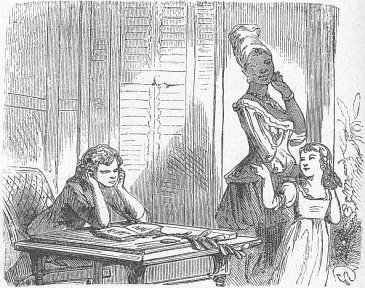
At this time the fog had not entirely disappeared, but the sun began already to pierce through the yellow mist which settled like gauze round the distant objects, and softened their outlines. Edward had fallen into a very dreamy state, when a certain rustling in a neighbouring ebony-tree suddenly attracted his attention.
The garden, we have said, was surrounded by prickly shrubs, forming an impenetrable wall; but beyond this enclosure was a line of tall trees intended to protect the plantations from the sun; the ebony of which we speak was one of these. Edward could see nothing at first through the dark, thick foliage; but having fixed his attention on one spot with the perseverance of a curious and idle child, he perceived at last an indistinct form in the thickest part. This form did not move, and at first seemed almost a part of the large branch which partly concealed it; but as the mist cleared off, the child distinguished a bearded head, whose sparkling eyes were turned towards him. He could not be mistaken, it was the orang-outang.
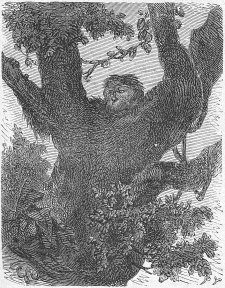
The orang was still partly hidden by the leaves of the tree; but his size was that of a tall man, that is to say, about six feet. His arms and legs were long and thin, though immensely strong; his stomach was large, and his chest square. His whole body was covered with reddish hair; but his face was bare, of a greyish colour, surrounded by a yellowish beard and whiskers. His mouth was wide, and his nose sunken; his little eyes looked gentle enough when he was not angry.
The orang seemed to find as much pleasure in examining Edward as Edward did in examining the orang. Stretched out on his branch, he did not stir, for fear, perhaps, of frightening the little boy away. His countenance was grave and melancholy; he looked in a caressing way at the child.
It did not need much to make Edward believe that he ought to improve his acquaintance with his new friend. He took from the table a bunch of bananas that the negress had left in case he wished to console himself during the fatigues of study by sucking one of these sweet-smelling fruits: he carried it to the window; then, having eaten one banana himself, he threw another to the orang.
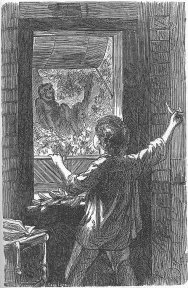
This time the child could hardly restrain a burst of delight; he pulled off the bananas one after another, threw them to his neighbour in the ebony-tree, and had the pleasure of seeing him catch the fruit with the same dexterity. Several of them, however, having been badly aimed, the orang did not try to catch, and did not at all seem to mind losing the delicious prize; one would have thought that he cared less for satisfying his own appetite than for showing goodwill to a weak and pretty creature whom he could have crushed with ease.
This game pleased Edward very much, and, as you may imagine, he quite forgot his lesson. Unhappily, the bananas were coming to an end, and he was thinking how he could get a fresh supply without awakening the suspicions of the people at home, when some loud voices were heard on the other side of the house. The orang became uneasy and crouched down more carefully among the leaves, leaving nothing visible but his eyes, and their expression was gloomy and ferocious. In vain Edward threw him his last banana; the orang no longer showed any wish to catch it; he had decidedly taken alarm, and perhaps from his elevated position he saw something that hindered him from taking any notice of these enticements.
Edward, in his turn, began to listen without further delay. The noise continued to increase, and among the shrill voices of the Chinese and negroes, he recognised his father's deep tones. Judging the opportunity favourable for escaping his geography lesson, he took leave very cavalierly of his friend, quitted the pagoda, and went straight through the house into the court, where a very unexpected sight met his eyes.
The house-servants were crowding thickly round a tree; they were in a state of great agitation, and were making such a noise that it could be heard at the end of the garden. But while the Malays seemed to be giving vent to imprecations and threats, the negroes were uttering lamentations, and the Chinese appeared to be defending themselves with all sorts of gesticulations and ridiculous demonstrations. In the middle of this tumult, Palmer was endeavouring to interpose his authority to obtain a little silence, and Doctor Van Stetten was carefully examining a man stretched motionless on the ground. A few steps behind, the presence of a sergeant and four soldiers in uniform showed that the case was serious enough to require the interference of public authority.
Edward was going to dash through the crowd, when Anna, who was in the veranda with her mother and aunt, called to him in a frightened voice:
"Stop, Cousin Edward; there is a dead man there!"
"Who is it?"
"The Malay Opium-Smoker."
"Yes, yes, come in, my dear," said the two ladies; "such a sight is not fit for you."
But Edward pretended not to hear them, and slipped into the front row of the spectators.
It was indeed Opium-Smoker who was lying there on the grass, with his skull fractured and bleeding. Two blacks going to their work had discovered the lifeless body in the plantations at a little distance from the balley. Their cries had attracted the passers-by; they had placed the corpse on a litter, and had brought it to Palmer's house, to which the deceased belonged.
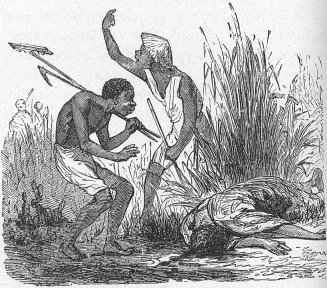
"Gentlemen," he said, "I have formed my opinion; this poor fellow has been killed by a frightful blow which has fractured his skull, and he has been dead about eight or ten hours."
"I believe you are right, doctor," replied Palmer. "Indeed, everybody could see yesterday at the balley that Smoker was amokspower, or on the point of becoming so. No doubt when his comrade carried him out and left him to himself, his head being very much confused with the opium, he fell furiously upon someone passing by, who knocked him down with a stick in self-defence."
"That is what I deny altogether," replied Van Stetten; "in the case you speak of, Palmer, the blow would have struck the front of the head. Now Smoker has been struck from behind; his death is the result of a crime."
The greater number of those present could not understand what was said, as they spoke in Dutch; but one of the negroes belonging to the house said in his jargon:
"It is Yaw, the Chinese, that has killed Smoker, me think. Yaw afraid of him, because Yaw had taken his opium, and Smoker going to revenge himself. Then wicked Chinaman, to be sure, hide himself, and when Smoker went by, he kill him."
"Yes, yes, it is Yaw!" said several voices in different languages.
"The thing is not absolutely impossible," answered Richard; "but how could this cowardly, faint-hearted Chinese dare to commit such a crime at the risk of being discovered? Well! we must question Yaw. Where is he now? In the sugar-cane plantation, I suppose?"
"No, no, massa," replied the negro, who seemed to have a grudge against the Chinaman for some old or recent injury. "Yaw not have been to the fields to-day; he stay at home, not dare to go out. You see very well that he be guilty!"
"Send for him at once," said Palmer authoritatively; "or, stay rather, I will go myself to look for him."
He went towards the frail little building that Yaw occupied in the enclosure; lively discussions were still carried on round the body while the doctor was explaining to Sergeant Muller a point of medical jurisprudence.
Palmer found the Chinese in the greatest terror. Prostrated before a little household god, Yaw was burning pieces of gold paper in order to propitiate the divinity. A man so saving as he was would think twice before offering such a costly sacrifice, but no doubt the danger seemed to him pressing.
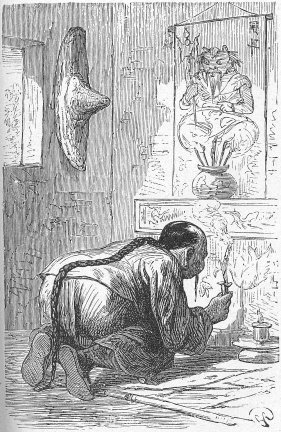
"Why are you not at your work?" asked Palmer sternly; "what are you doing here? Why are you frightened if you are innocent?"
"Yaw has a conscience as white as a sheet of paper before the learned man has written on it with his pencil. Yaw was Opium-Smoker's friend --- two fingers of one hand. He will give back the box that belonged to Smoker; he never thought of keeping it for himself; he only intended to take care of it for him that he might not get amokspower ---"
"That is not the question; I ask you what are you doing here? why do you seem to be hiding yourself when this poor man's death has upset the whole house?"
"Yes, yes! he is dead!" answered Yaw, in grotesque despair. "I have lost the friend of my bosom, the flower of my garden; the lamp of my dwelling is put out. Yaw is afraid of the Malays, who are always trying to plant their kris in the breast of a Chinese. Poor Chinaman! always persecuted because misery has compelled him to leave the flowery Celestial Empire!"
Palmer grew impatient with this talk.
"Come," he said, "if you can prove yourself innocent, go and do so before your comrades, and before the armed force that will seize you if you are proved guilty."
Yaw tried to resist; but Palmer seized him with a strong hand, and dragged him into the court, where the supposed murderer was received with cries of indignation and anger. The Chinaman began to defend himself warmly, when all at once his look was arrested, his voice died on his lips; he perceived Elephant- Slayer, the deceased's particular friend, running to the place with all haste. Légère, who was with her father, was speaking to him in a low tone, and no doubt she was relating the tragic event to him, for the Malay wore his most threatening aspect.
However, he did not attack Yaw at once, but leant over the corpse, as if he intended to form his own opinion of the case. In a few minutes, to the great surprise of the spectators, he drew himself up and said quietly:
"Yaw did not kill Smoker." Everybody exclaimed. The Malay continued, with the" confidence of a man persuaded that he is right:
"Yaw is a miserable Chinese, with no strength or courage; his arm could not have inflicted such a wound. You see, only one blow has been struck, and the skull has been crushed like the tiger's! It is the orang that has killed Smoker."
"The orang!" repeated Edward, as he looked in a frightened way at the trees in the garden.
This assertion was believed by all who were acquainted with the great experience of the Malay hunter; but Palmer, Van Stetten, and Sergeant Muller, who represented at the moment both the civil and military authority, asked for further explanations. Then Elephant-Slayer, with a kind of brutal impatience, explained that the preceding evening, after the scene we have described, he had carried his comrade to the place where his corpse had been found; that no doubt Smoker, struggling against the feeling of intoxication, had had sufficient strength to get up, and that the orang-outang, perhaps attracted into the neighbourhood of the balley by the light and music, had struck him a blow such as no human arm could have given.
This explanation reminded Richard of the cry he had heard as he was returning home, and the gigantic figure, armed with a club, he had seen retreating into the darkness.
"Elephant-Slayer is right," he answered; "what he has guessed, I can almost say I have seen." He related his adventure in a few words, and everybody was soon perfectly convinced of the way by which the herdsman of the farm had come by his death.
Poor Yaw, entirely exculpated, was as extravagant in his expressions of joy as he had been in his grief; it would be in vain for us to attempt to describe his twistings and turnings, his absurd exclamations, his whimsical figures of speech. At last he waddled back to his hut, and, in order to make up for all the troubles of the morning, prepared for himself one of his most delicious dishes --- earth-worms cooked in a sauce made of woodlice.
But the fact that Opium-Smoker had been struck dead in the middle of the village made the inhabitants very uneasy, for everybody had good reason to fear a like fate for himself. The invisible enemy would be seizing new victims, no doubt, in the avenues and orchards by day as well as by night, and it would certainly be advisable to rid the colony of such a curse as quickly as possible.
"Me not dare leave my hut to go to the fields," said one of the trembling negroes.
"The orang strikes like a thunderbolt, and his club is as big as the mast of a junk," said one of the Chinamen.
"Well! he does not frighten me!" said Elephant-Slayer, "and I will avenge Smoker's death." "I will not prevent you now, Elephant- Slayer," replied Palmer.
"I intended at first to spare the orang on account of the service he rendered my son, but this last deed of his removes all my scruples. You may set out at once to hunt for this dangerous animal; and any of my men, who would like to go with you, are free to do so, and I will supply arms and ammunition. I should like to have gone myself, but I have sent word to the Governor that I intend to pay my respects to him to- day, and he will be expecting me at the fort."
And he looked at his young wife, who seemed to be waiting for him impatiently in the veranda.
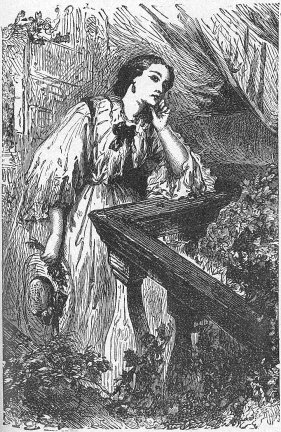
"That's right, Palmer," he said, very well pleased; "that is a determination that may do something for science. As for me, I will give ten pagodas for the skin of the orang, and then I shall be making a good bargain; for, of all the creatures in the world, there is not one so little known in Europe."
"I will tell our men of your promise, my good Van Stetten, and no doubt it will work wonders. But yet would it not be better to try and take the creature alive?"
"Alive!" repeated Van Stetten; "I would give one of my eyes for a living orang; but who could take him alive, when he springs from tree to tree as if he had wings? Not all the men in the colony would be strong enough to hold him, and he would break every rope like a thread if it were not as strong as a cable. So it would be best to rid the country of him as soon as you can, and let me have his skin to send to the Museum at Leyden as quickly as possible."
The ten golden pagodas promised by Van Stetten to the conqueror of the ape roused the avidity of the spectators, and the hunt was arranged on the spot. Two blacks from the farm, five or six Malays, among whom was Boa, a renowned hunter, and several Dutch soldiers belonging to the garrison, and Sergeant Muller himself, offered to beat the neighbourhood at once under the guidance of Elephant-Slayer, who was appointed leader of the hunt on account of his great experience; Dr. Van Stetten proposing to accompany the expedition as a mere observer.
These arrangements made, Richard ordered the Chinamen to carry the body of Opium-Smoker to the cemetery of the colony, and he sent to the house for arms and ammunition, where a good supply was always kept. When all was ready, someone asked in a determined tone:
"Well, but where is this terrible monkey?"
"Over our heads, perhaps!" answered Elephant- Slayer, looking up into the thick foliage of the trees beneath which they were standing.
The band of hunters were seized with panic at the idea, and more than one had some thought of running away, but seeing their leader remain calm after a rapid examination of the trees, they took courage again.
"He is not there," said Elephant-Slayer; "he must be in some other high tree in the neighbourhood, and we must pay a visit to them all, one after another. He generally lies down on a large branch during the heat of the day. Be on the watch, and on the least movement in the leaves, fire all at once. It takes more than one ball to kill an orang."
Palmer having again advised them to be careful, and to walk close together, they set off, followed closely by the good doctor, whose only weapon was his big umbrella or parasol, for the old thing served both purposes. As for Palmer, after having ordered the negroes who had been left behind to get a palanquin ready to carry Elizabeth to the Fort, he hastened home. Edward had gone to the house before him, and the child was not a little alarmed at the danger which was threatening his friend the orang- outang.
It was plain that the ape, in spite of his prodigious strength and agility, would find himself in a scrape. If he had not quitted his post in the ebony-tree, it would be easy to surround him and cut off his retreat into the woods. However, Edward never thought for a moment of betraying his deliverer's hiding-place; the bleeding form of the Malay inspired him with as much pity as horror, but he resisted these feelings, and obstinately repeated to himself, "Smoker was ugly and wicked- and then the man who does not talk killed the tiger; and I will not have him killed!"
Not being able to resist the temptation of learning what had become of the monkey, he slipped into the garden, and began to watch the great ebony-tree. A slight movement in the leaves showed that the orang was still there. In a little time he saw him even raise his head cautiously, and turn his piercing eyes on the band of hunters. He seemed to be aware of danger, and moved most warily. At the same time he did not appear to mistrust the child; he seemed rather to consider him as an ally, ready to help him in time of need, than as one of his enemy's spies.
Fortunately the hunters, who were examining the trees in the plain, had started in an opposite direction to that of the garden. They were making a great noise, firing every now and then to frighten the orang and make him come out of his retreat. A crowd of colonists, chiefly children, had joined them and were shouting with the same intention. However, it was not likely that the noisy band would think of looking for the enemy so near the houses; they supposed that he would more likely have retreated to the border of the forest, and it was in that direction that they were pursuing their investigations.
Edward's contemplation of the tree was disturbed by someone calling to him from the house. He must go, and though the danger to his friend was not imminent, Edward could not help saying innocently to him aloud:
"Take care of yourself, poor orang!"
Again the orang showed his intelligent face among the leaves, as if he wanted to thank him for his advice; then Edward, hearing himself called a second time, ran into the house.
Mrs. Palmer and Mrs. Surrey were waiting for him impatiently; his father and mother wished to take him with them to the Fort. He was to go in the palanquin with Elizabeth, who was already dressed for the visit, while his father intended to walk. In a short time Edward was in all the delight of admiring himself in his best clothes, of riding in a palanquin, of not having to repeat a lesson he had not learnt; and the orang, the death of Smoker, and all the events of the morning, were forgotten.
"Upon my word, Palmer, this is too bad! You told me you were going to pay me a visit; but you did not say that Mrs. Palmer herself would do me the honour, the pleasure --- and you take me by surprise, as you see."
He offered his visitors seats; and Edward, who did not approve of not being noticed, pulled him by the sleeve, and said: "How do you do?"
"Ah! ah! there's my friend Edward!" cried the good Governor, laughing; "I am very glad to see him too. But as for him, I need not thank him for his visit; he would go anywhere, provided he went in a palanquin;" and Grudmann burst out laughing.
The conversation was carried on merrily, for some little time. Palmer cut his visit short, for the weather looked threatening, and he feared a violent storm.
So he and Elizabeth hastened to take leave of the Governor, and, leading Edward away, set out on their return home.
The clouds that had been visible for some days in the usually clear sky of Sumatra now formed a thick veil over the sun, and masses of vapour, rising from the sea, were darkening the air more and more. Still the heat continued overpowering: an indescribable feeling of discomfort oppressed every living thing; nature herself seemed sick, in the anticipation of one of those convulsions so terrible at the equator.
A breeze, as scorching as the air of a furnace, blew only in gusts, and yet the leaves of the clove, coffee, and cinnamon trees fluttered incessantly, while large, lazy waves broke with a loud noise on the shore.
The details of this grand and alarming picture were still more apparent when they left the enclosure of the Fort and reached the drawbridge, from which the sea, the river, and the whole valley as far as the forest, were visible. Looking landwards, the avenues appeared deserted, and the plantations abandoned for the time; for everybody was busy about Van Roer's ship, the Gertrude, which was preparing to set sail. The crew were working half-naked, and were trying to complete the cargo, and the negroes and Malays were helping in this hard work; but, overpowered by the extreme heat of the weather, they were all obliged, from time to time, to throw themselves into the river, in spite of the crocodiles, to cool themselves, and get fresh strength and vigour. Yet both land and sea seemed as silent as the grave. Elizabeth had got into her palanquin again, and was trying in vain to obtain a little air by fanning herself with her large Japanese fan. As to Edward, he was allowed to walk home, and running by his father's side, he was looking about him with a childish curiosity that nothing could repress.
As they were descending the winding path that led to the village, the stillness of the plain was broken by a sudden tumult. First the firing of several guns was heard, and then a confused noise of shouting. The sounds did not proceed from the river-side, for the men were going on with their work at the Gertrude quietly enough, but from the middle of the village, and it really seemed from Palmer's house.
Richard stopped directly, and ordered the bearers to stop too. It might be dangerous to proceed, and it was only prudent to wait till they could discover what was happening. Elizabeth leaned out of the door of her palanquin to ask anxiously the reason for this halt; but no explanation was necessary.
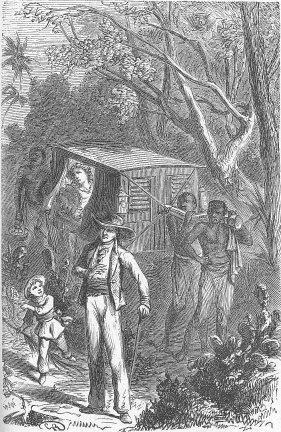
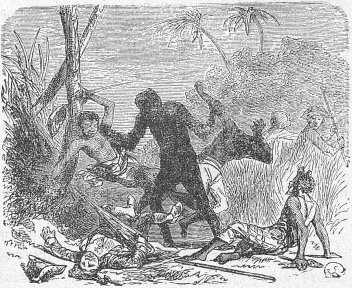
"Poor creature!" cried Edward; "then they have found him?"
But no one noticed the evident regret of the little boy.
"Is it not good Dr. Van Stetten who has been knocked down there?" added Palmer. "Yes, it is, but he is getting up again, I am glad to see, and the others too. Come! they have only been well frightened. The orang had not his club; it was that saved them."
"Thank God!" sighed Elizabeth, falling back on her palanquin cushions; "these orangs are terrible animals."
"Father," said Edward, "as the poor orang has not hurt anybody, will they go after him again? will they kill him? I wish they would not; he saved me, --- he is my friend!"
"We must," replied Palmer; "we must get rid of him as soon as possible, or the country will not be safe. Go on," he continued, speaking to the bearers of the palanquin, "there is no danger now."
"Edward, take hold of your father's hand!" said Elizabeth quickly.
They set off again. The shouts and firing still continued, but they seemed to be dying away in the distance. As they reached the village, they met Van Stetten limping along, with his wig all awry, and his clothes torn and dusty. He was proceeding, slowly and painfully, towards his own house.
Mr. and Mrs. Palmer stopped again, to inquire if he was much hurt.
"Ah, my good neighbours," he said, in a tone half-tragic and half-comic, "I shall not forget my meeting with this diabolical ape in a hurry! He is neither a man nor an animal; but a fiend let loose that has iron muscles, and can fly in the air without wings. They dislodged him from the great ebony- tree close to your garden, and chased him from tree to tree as far as your pepper-field, and then, all of a sudden, he fell upon us like a thunderbolt. Without any weapon but his long arms and powerful fists, he knocked down everybody that came in his way, and escaped from us so quickly that no one could say how he did it."
"But are you sure," asked Palmer, "that nobody has been hurt in the skirmish?"
"Elephant-Slayer has had some teeth knocked out in his fall, and his gun has been broken-his old matchlock, you know; Elephant-Slayer will never forgive the orang for this."
"Bah! I will give him another gun. As for his teeth, a Malay's teeth are not worth much." "One negro, I believe, has an arm dislocated; but that I must see to."
"And you yourself, my good doctor," asked Elizabeth, "are not you hurt?"
"Don't speak of it, dear lady. I was thrown down as violently as if I had been struck by the sail of a windmill. My hat was knocked off and my spectacles broken. That I was not killed on the spot, I owe perhaps to my umbrella, which turned the orang's blow aside, and broke my fall. Just see the state it is in."
And he tried in vain to open his umbrella, a shapeless mass of broken wood, bent whalebone and stuff all in shreds.
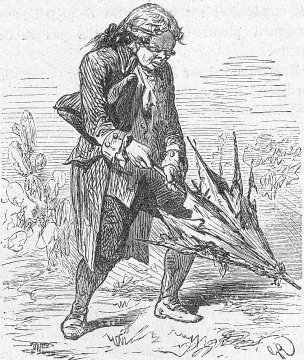
"Ah! ah! how capitally he has defended himself, my friend the wild man of the woods!" Nobody heard these words. The child asked Van Stetten:
"Doctor, is the orang hurt?"
"No, my boy, none of the balls hit him. His movements are so sudden and rapid, that none of our best marksmen can get a fair shot at him."
"What is the matter now?" asked Palmer; "is the orang coming this way?" Elizabeth started with fright, and Van Stetten prepared to defend himself with his umbrella; but it was a false alarm, and the quiet faces of the village people showed that there was no danger near. A negro from the house, who seemed to be coming from the scene of action, ran to meet his master and mistress.
"Well, Darius," asked Palmer, "what news do you bring?"
"Ah! massa!" answered the negro, with all sorts of strange demonstrations, which might be taken to express joy, or anything else; "him be taken this time!"
"Who is taken?"
"Him --- the man who does not speak!"
"What do you say?" cried Van Stetten; "you have succeeded in taking the ape alive? That can't be! He would have beaten you all to powder twenty times over before he would have let anyone of you come near him."
"Ah, massa!" said Darius, still grinning, him be taken, but we not got hold of him yet." "What is this fool of a negro talking about? Tell us what you mean, blockhead!"
Poor Darius, disconcerted by the doctor's roughness, got very confused in his way of explaining himself. Palmer, however, questioned him gently, and was not long in learning the truth.
The ape, having escaped the hunters, went off in a straight line towards the forest, and was not long in getting considerably ahead of them. Unhappily for him there was another open space between the plantations and the great forest, and he found himself under the necessity of coming down to the ground, and walking to reach his usual place of refuge. With the help of a great stick that he broke off a casuarina, or ironwood-tree, he was scrambling across with all possible speed, when he was overtaken by his pursuers. At first he kept them off by brandishing his formidable club; but the balls and arrows were whistling round his head, and, bold as he was, he felt the necessity of getting under shelter as quickly as possible. In his perplexity, he took a step that might have proved fatal to him.
The valley of New Drontheim reaches, as we have said, to the foot of high volcanic mountains, and at the place where the orang was thus pursued some blocks of basalt formed an advanced point on the plain. In the middle of these rocks was a deep cavity, from which flowed a copious stream, and the waters had worn a narrow passage through the rocks which was the only entrance to this enclosed space. Now it was into this passage that the orang was seized with the unlucky idea of entering, hoping perhaps to gain by that means the wooded summit of the rocks; but he was soon undeceived. At the end of the opening he found himself in a deep hole with perpendicular walls, smooth, hard as marble, and which it was quite impossible to climb. He tried at once to turn back, but he was too late. The whole band of hunters rushed upon him, like a pack of baying hounds, at the entrance of the gorge; retreat was impossible.
The orang drew back with a low growl, striking the rocks with his stick, and splashing the water of the stream with his feet. The assailants, on their part, lost no time; some of them kept up a constant shouting to frighten the orang, while the rest rolled great blocks of stone into the opening, only leaving just space enough for the water to flow out. So in a few minutes the formidable animal was shut up in a prison from which neither his extraordinary strength nor his great agility could deliver him.
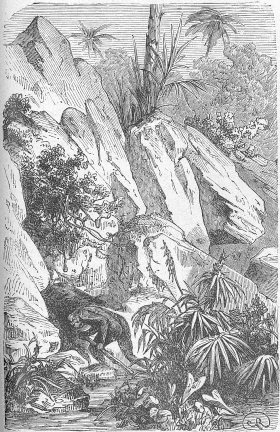
Palmer told the negro to follow him home, and he would give him the gun he wanted. As to Dr. Van Stetten, nothing could express his joy when he learned that the orang was caught.
"We shall catch him alive!" he cried. "Darius, you may tell the hunters that instead of ten gold pagodas, I will give them twenty if they bring me this precious animal alive. You may tell Slayer that I will cure his wounded cocks, that I will give him as much opium as he pleases. What a grand thing it will be if I am able to send to Europe the first full-grown orang that has ever been seen there!"
"Take care, doctor," said Richard, shaking his head; "only this morning you thought it would be utterly impossible to secure him."
"But he is a prisoner now; if we do not let him get any sleep or food we shall soon subdue him. I will go and speak to Elephant-Slayer about it at once, and in three days I shall have made him as gentle as a lamb. Want of food and want of sleep succeed with the most ferocious animals."
"What!" said little Edward, with tears in his eyes, "you mean to starve the poor orang, that saved me from the tiger ?" No one answered him.
"Darius," asked Elizabeth, "are you quite sure that the orang cannot escape from the place where you have shut him in?"
"No danger, ma'am; we throwed stones as big as a house into the opening; he no more get away; and the hunters, too, guard the passage carefully. Me have mounted on a rock to look at him at the bottom of the ditch. How funny he do look down there. He grind his teeth and want to tear me to pieces --- and me laugh!"
At the same time, Darius showed his white teeth, and clapped his hands with almost childish joy.
"But can't he climb up the sides of the ditch? They say these monkeys climb so well, and are so strong!"
"No danger, I say once more, ma'am," answered the negro; "if you only saw, twenty feet deep! For that the man who cannot talk get out of that, he must have a rope tied to one of the trees at the edge of the pit, and thrown down to him. But who throw the rope? not Darius, very sure!"
"A rope" murmured Edward; "it only needs a rope to save him?"
And he began to think.
"Well, Richard," said Elizabeth to her husband, "as there is nothing to be afraid of, let us go on."
They took leave of the doctor, who returned in all haste to Fontaine-des-Laves; and, accompanied by Darius, they pursued their way home.
Half-an-hour later, Anna and Edward might have been seen in a room on the ground-floor under the care of Maria. The negress was busy making up a dress of a fine deep lemon colour, which, with a poppy-coloured silk handkerchief for a head-dress, would form a toilette, she thought, that would dazzle all the blacks in the neighbourhood at the next bimbang.
But as the poor woman was not a very clever dressmaker, she would have made but poor work of it if Anna had not helped her with her needle and good taste. Thanks to Anna, the dress did seem almost fit for a human creature; and Miss Surrey was making the utmost use of her pretty fingers to finish the work, to the lively satisfaction of her companion.
Edward moved restlessly about the two workers; he was more serious and less noisy than usual, and seemed very busy making himself a new bow. However, he frequently stopped in his work to go to the window overlooking the garden, and gazed at the ebony-tree in which he had seen the monkey that morning. .
Once when he turned silent and pensive to his cousin, the latter, without stopping her work for a minute, asked him in an absent manner:
"Edward, have you learned your geography lesson?"
"Of course I have."
"Then say it to me while I am working."
"I have not my book."
"That does not matter, I know it by heart."
"But --- but I have forgotten it since the morning."
Anna looked at him reproachfully and sighed.
After a minute's silence, Edward continued:
"Anna, did you hear them say that they were going to starve the poor orang? It must be a horrid thing to be starved!"
"So it must be; the creature saved your life and Maria's, and I cannot help pitying it."
"You do pity it?" asked the child, trembling; "then you would not be sorry if it did escape from Fontaine-des-Laves?"
"I should be very pleased."
Anna, in saying this, was only expressing a feeling of pity, and she little guessed how many tears this unfortunate speech would cost her.
Edward seated himself in a chair more quietly than was at all usual with him. But suddenly he got up again and went to the door.
"Where are you going?" asked his cousin.
"You know very well," answered Edward, somewhat embarrassed, "what you told me this morning. I am going to pick you some flowers."
"Go, if you like. You will find pretty flowers in the garden."
"In the garden! --- oh, dear! there are much prettier at the foot of the waterfall."
"I don't want those!" answered the little girl in a peremptory tone; "I will not have them!" "Then I will go into the garden."
"Massa Edward, you no go far," said Maria as he went out; master want to take you to see the sailors go away."
"All right! I will be there."
And he left the room. Anna and the negress continued to cut out and stitch very busily. As the child did not come back, Anna left her work for a minute and went to the window. She saw Edward in the garden, plundering the flower-beds. Reassured, on this point, she went back to her seat, and listened to an interminable story that Maria was telling to keep her patiently at work with the hems and fells of the yellow dress.
More than half-an-hour passed in this way. It was getting dark, the weather was becoming gloomy, and the storm, that had been brewing all the morning, now seemed imminent; Anna stopped the negress in the middle of her story ---
"Where can Edward be?" she cried, running again to the window.
She called her cousin. No one answered; but she found on the window-sill a charming bouquet that had been put there for her. She took the flowers, but her anxiety did not decrease, and she said with some agitation:
"Where can he have gone? He is so rash, so venturesome."
"Don't worry, Miss Anna," replied the negress, "but finish the gown very quick for poor Maria. Dare say little Massa Edward gone with massa, whom me heard go out just now."
"That's it," answered Miss Surrey, breathing more freely; "he must have gone out with his father. He might have said good-bye to me."
And she pouted coquettishly; but soon began to smell the bouquet, smiled, and resumed her work. Richard, it was true, had just gone out, but alone, to be present at the departure of the ship. Not wishing to expose his son to the coming storm, he had made up his mind to leave the child at home, and had left the house quietly.
When Palmer, in a great heat, reached the port of New Drontheim, the vessel had already gained the middle of the river. Palmer made his adieux to the captain and his company, who then went off in a boat to the ship.
A few minutes after, Grudmann and Palmer found themselves alone on the shore with a few lookers-on. The ship sailed along with difficulty, being impelled by such an uncertain wind. At the moment it drew near the little island at the mouth of the harbour, a great noise was heard landwards, clouds of sand blew wildly about, the trees groaned and bent to the ground, the river and the sea, which were a dull leaden colour before, were covered in a minute with a foam as white as snow.
When the squall fell on the ship, it bent over in such a way that it looked as, if it must go down; but it rose again directly and advanced towards the open sea.
"What a wind!" said the Governor; the Gertrude will make a good, quick passage, I hope."
"Don't you think, Major," asked Palmer anxiously, "that a tempest that begins in this way may be very dangerous for friends on board?"
"Well, the wind blows from the land, so it is favourable for going out of port. If once the vessel is out of the river, the storm may rage as much as it likes; if it blows a hurricane the Gertrude won't mind."
In spite of the Major's confidence the Gertrude struggled with difficulty against the storm, whose violence increased every minute.
The ship had taken in almost all her sails, and for a moment she rolled over on her side, beating the waves with her lower yards; but she rose again quickly, and cut a way proudly for herself through the foaming waters. She directed her course towards a kind of little strait that she must cross to gain the open sea; but, before she reached it, the waves became so high, the mist which filled the air so dark, and the clouds of dust so thick, that those on shore lost sight of her completely.
The Major hurried home to avoid the rain that he knew would soon fall in torrents, and of which the distant thunder already gave warning. Palmer remained alone on the beach at the risk of being blown down by the wind, or carried away by one of the monstrous waves that dashed violently on the shore, and tried again and again, but in vain, to get a glimpse of the flying ship on the horizon. A fresh occurrence, however, compelled him to turn his attention to another quarter.
In the midst of this war of the elements, several shots, and then frightful cries at the other end of the settlement, were heard. Richard tried to discover what could be the cause of this noise; but on the land, as well as on the sea, it was impossible to distinguish anything a few steps off, in spite of the dazzling lightning that was beginning to flash. The planter, haunted by a vague presentiment, determined to go to the village to learn what it was. So he set off to walk, but not without difficulty, for the wind threatened every minute to throw him down, and he was blinded by the dust, dry leaves, and rice straws that were flying about all around him. At last he gained a spot a little more sheltered from the tempest, where he met Darius, who was running about like a madman, or as if he were himself the plaything of the furious wind.
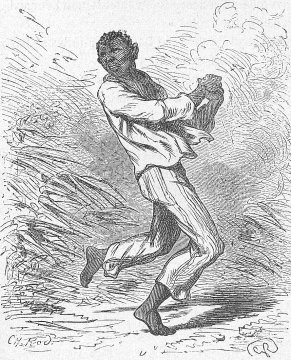
"O master! master! such a trouble! You die of grief!"
"What has happened, Darius?"
"Me not dare say --- such a great trouble! Dear little Massa Edward!"
"Edward!" exclaimed the planter; "what do you know about Edward? Speak, speak at once, I tell you!"
The negro was so frightened that his teeth chattered.
"No, no, never!" he cried, "you would kill me. Mercy, mercy, master! poor Darius be innocent of all!"
"I won't hurt you; I only want to know what it is about my child, my Edward. Will you speak, you rascal?"
He tried to seize Darius by the arm; but he sprang back.
"No, no, me cannot tell!" he repeated, almost beside himself go to Fontaine-des-Laves, then you learn the truth."
And he ran off as fast as he could go, leaving Palmer in the greatest anxiety. The planter tried to call him back and to run after him, but Darius was already far away. Palmer then, almost distracted, set off for Fontaine-des-Laves, where he was to learn the explanation of the negro's words.
Comments/report typos to
Georges
Dodds
and
William Hillman
![]()
![]()

![]()
BILL
HILLMAN
Visit
our thousands of other sites at:
BILL &
SUE-ON HILLMAN ECLECTIC STUDIO
ERB
Text, ERB Images and Tarzan® are ©Edgar Rice Burroughs, Inc.-
All Rights Reserved.
All
other Original Work ©1996-2007 by Bill Hillman and/or Contributing
Authors/Owners
No
part of this web site may be reproduced without permission from the respective
owners.